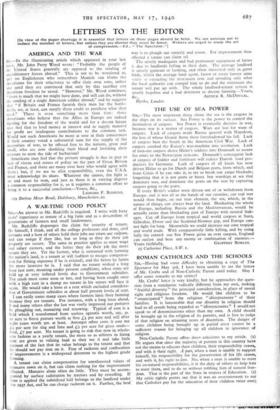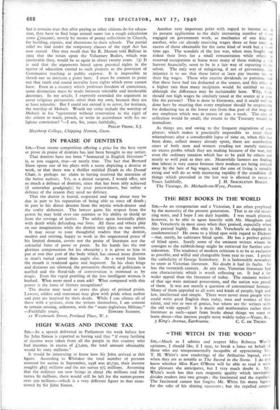ROMAN CATHOLICS AND THE SCHOOLS SIR,—Having had some difficulty in
obtaining a copy of Th. Spectator for May 3rd, I have been unable to see the letters of Mr. Crofts and of Non-Catholic Parent until today. May I offer some remarks to my critics?
Mr. Crofts' letter is very kindly; but he approaches the ques- tion from a standpoint radically different from my own, making "fruitful diversity" the principal consideration, in place of moral right and religious freedom. He would like children to be " emancipated " from the religious " idiosyncrasies " of their families. It is lamentable that our disunity in religion should lead to all creeds being regarded as "idiosyncrasies." I would not speak so of denominations other than my own. A child should be brought up in the religion of its parents, and is free to judge of that religion on attaining years of discretion. The danger of some children being brought up in partial error cannot be a sufficient reason for bringing up all children in ignorance of religion.
Non-Catholic Parent offers threm criticisms to my article. (i) He argues that since the majority of parents in this country have not the means to educate their children, their responsibility ceases, and with it their right. A pan, when a man is unable to support himself, his responsibility for the preservation of his life ceases, and with it, his right to live. No; when a man is unable to meet his co-natural responsibilities, it is the duty of others to help lum to meet them, and to do so without robbing him of natural free- dom. That is the part of the State in respect of Education. (2) My critic rightly points out that it was an overstatement to say that Catholics pay for the education of their children twice over;
but it remains true that after paying as other citizens do for educa- tion, they have to find large annual sums (on a rough calculation some Lzoo,000), mostly by means of penny collections in Church, for building, repairs, and alterations to their schools. The partial relief we had under the temporary clauses of the 1936 Act has now ceased. One may recall that Sir R. Morant told Balfour in 1902 that the strain upon the Voluntary Bodies, which was intolerable then, would be so again in about twenty years. (3) It is said that the arguments based upon parental rights in the matter of education extend to such projects as the provision of Communist teaching at public expense. It is impossible to thrash out so intricate a point here. I must be content to point out that truth and sound morality have rights which error cannot have. Even in a country which professes freedom of conscience, some distinction must be made between tolerable and intolerable doctrines. In my article, I expressly extended the argument to cover religious persuasions other than my own, because they are at least tolerable. But I could not extend it to cover, for instance, the worship of Moloch. Would my critic include the worship of Moloch in his "agreement without reservation to the right of the citizen to teach, preach, or write in accordance with his re- ligious conviction? "—I am, Sir, yours faithfully,



































 Previous page
Previous page